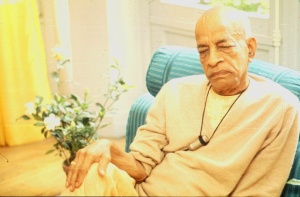CC Antya 6.219: Difference between revisions
m (1 revision(s)) |
No edit summary |
||
| Line 1: | Line 1: | ||
{{ | [[Category:Sri Caitanya-caritamrta - Antya-lila Chapter 06]] | ||
<div style="float:left">'''[[Sri Caitanya-caritamrta|Śrī Caitanya-caritāmṛta]] - [[CC Antya|Antya-līlā]] - [[CC Antya 6|Chapter 6: The Meeting of Śrī Caitanya Mahāprabhu and Raghunatha dasa Gosvāmī]]'''</div> | |||
<div style="float:right">[[File:Go-previous.png|link=CC Antya 6.218|Antya-līlā 6.218]] '''[[CC Antya 6.218|Antya-līlā 6.218]] - [[CC Antya 6.220|Antya-līlā 6.220]]''' [[File:Go-next.png|link=CC Antya 6.220|Antya-līlā 6.220]]</div> | |||
{{CompareVersions|CC|Antya 6.219|CC 1975|CC 1996}} | |||
{{RandomImage}} | |||
==== TEXT 219 ==== | ==== TEXT 219 ==== | ||
<div | <div class="verse"> | ||
keha chatre | :keha chatre māgi' khāya, yebā kichu pāya | ||
keha rātre bhikṣā | :keha rātre bhikṣā lāgi' siṁha-dvāre raya | ||
</div> | </div> | ||
| Line 12: | Line 16: | ||
==== SYNONYMS ==== | ==== SYNONYMS ==== | ||
<div | <div class="synonyms"> | ||
''keha''—some; ''chatre''—at the almshouse; ''māgi'' '—begging; ''khāya''—eat; ''yeba''—whatever; ''kichu''—little; ''pāya''—they receive; ''keha''—some; ''rātre''—at night; ''bhikṣā lāgi'' '—for begging alms; ''siṁha-dvāre raya''—stand at the gate known as Siṁha-dvāra. | |||
</div> | </div> | ||
| Line 19: | Line 23: | ||
==== TRANSLATION ==== | ==== TRANSLATION ==== | ||
<div | <div class="translation"> | ||
It is a custom for some Vaiṣṇavas to beg from the charity booths and eat whatever they obtain, whereas others stand at night at the Siṁha-dvāra gate, begging alms from the servants. | It is a custom for some Vaiṣṇavas to beg from the charity booths and eat whatever they obtain, whereas others stand at night at the Siṁha-dvāra gate, begging alms from the servants. | ||
</div> | </div> | ||
__NOTOC__ | |||
<div style="float:right; clear:both;">[[File:Go-previous.png|link=CC Antya 6.218|Antya-līlā 6.218]] '''[[CC Antya 6.218|Antya-līlā 6.218]] - [[CC Antya 6.220|Antya-līlā 6.220]]''' [[File:Go-next.png|link=CC Antya 6.220|Antya-līlā 6.220]]</div> | |||
__NOTOC__ | |||
__NOEDITSECTION__ | |||
Revision as of 08:04, 8 October 2021
Śrī Caitanya-caritāmṛta - Antya-līlā - Chapter 6: The Meeting of Śrī Caitanya Mahāprabhu and Raghunatha dasa Gosvāmī

His Divine Grace
A.C. Bhaktivedanta Swami Prabhupada
A.C. Bhaktivedanta Swami Prabhupada
TEXT 219
- keha chatre māgi' khāya, yebā kichu pāya
- keha rātre bhikṣā lāgi' siṁha-dvāre raya
SYNONYMS
keha—some; chatre—at the almshouse; māgi '—begging; khāya—eat; yeba—whatever; kichu—little; pāya—they receive; keha—some; rātre—at night; bhikṣā lāgi '—for begging alms; siṁha-dvāre raya—stand at the gate known as Siṁha-dvāra.
TRANSLATION
It is a custom for some Vaiṣṇavas to beg from the charity booths and eat whatever they obtain, whereas others stand at night at the Siṁha-dvāra gate, begging alms from the servants.